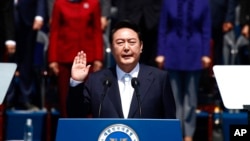Beneath a sunny spring sky and before tens of thousands gathered at the parliamentary front lawn, Yoon Suk-yeol took the oath of office Tuesday as South Korea's 13th president.
Yoon, in a light blue tie, promised to do his utmost to elevate the country and make it respected by the world, based on the pillars of freedom, human rights, fairness and solidarity. The newly inaugurated leader also pledged to rebuild a "great nation … that truly belongs to the people."
From the rising cost of housing, food and commodities to the ongoing pandemic, global warming and shifting geopolitical loyalties, myriad challenges at home and abroad were not lost on Yoon, who up until early spring of last year worked as a career prosecutor and lawyer.
"It is futile to differentiate between domestic issues and international issues," he told the crowd. "When we assume a greater international role, we can also find the right solution for many of our domestic challenges."
The 61-year-old, who won the March presidential election by less than a percentage point, launches his five-year term with relatively low public expectations. Yoon takes the helm of the world's 10th-largest economy while facing repeated weapons testing by his country's neighbor to the north.
Most immediate security threat
In his inaugural address, President Yoon called North Korea's nuclear weapons program a threat to the security of not only South Korea but also the East Asia region at large.
The new statesman nevertheless invited Pyongyang to dialogue. And should North Korea embrace a genuine process for complete denuclearization, Yoon said his government would work with the global community on an "audacious plan that will vastly strengthen North Korea's economy and improve the quality of life for its people."
Earlier, at midnight, Yoon received his first military briefing as head of state at an underground bunker beneath the Defense Ministry complex that now houses his relocated presidential office. South Korea's military believes North Korea is close to completing preparations for a nuclear test that could come as early as this month, at leader Kim Jong Un's orders.
North Korea has held 15 rounds of weapons testing so far this year, including an intercontinental ballistic missile in March. The latest, a submarine-launched ballistic missile, occurred three days ahead of Yoon's inauguration.
President Joe Biden will visit Seoul and Tokyo starting later this month. In Japan, he will take part in a leaders' summit of the Quadrilateral Security Dialogue, or Quad. The bloc, which comprises India, Japan, United States and Australia and is viewed as an alliance to contain Beijing's growing power in the Indo-Pacific region, has been acerbically dubbed by China as "the Asian NATO."
Feeling out the lines
Yoon said, should South Korea be invited to join the Quad, he would see that as a positive development. In an interview with VOA Korean Service in late April, he said he hoped to expand Seoul's scope of cooperation on global issues to include the Quad when he hosts President Biden in Seoul on May 21.
That would not sit well with China, South Korea's largest trading partner. Nor would Yoon's campaign pledge of seeking to install another U.S.-made anti-missile defense system, THAAD (Terminal High Altitude Area Defense), which he had contended was needed to boost South Korea's defenses against North Korea's advancing missile capabilities.
Dispatched by Beijing at attend Yoon's inauguration, Chinese Vice President Wang Qishan indirectly broached both ideas.
During a meet-and-greet at Yoon's office on Tuesday, Wang offered five suggestions for improved bilateral ties, including "properly handling 'sensitive issues'" and bolstering cooperation with China in resolving peninsular matters. Wang said China wanted to see relations between the two Koreas improve, as he delivered a letter from Chinese President Xi Jinping and extended an invitation for Yoon to visit Beijing at a mutually agreeable time.
Yoon, according to local reports, thanked Wang but responded that he looked forward to welcoming Xi to South Korea. His predecessor, President Moon Jae-in, visited China twice during his tenure and had awaited Xi's reciprocal visit to the Korean Peninsula.
Receiving Japan Foreign Minister Yoshimasa Hayashi, Yoon struck a welcoming tone as he asked the top envoy to continue engaging in thoughtful dialogue with his foreign minister nominee to improve their bilateral relationship, which is at a decades-long low.
Topping the day's diplomacy at Yoon's makeshift Yongsan office, however, was the U.S. delegation. Second gentleman Douglas Emhoff said it was an honor to be the first delegation to be received at Yoon's new office as he delivered a letter from President Joe Biden in which the U.S. leader expressed a desire for close cooperation with South Korea.
Before reporters were ushered out of the room, Yoon responded that this first meeting reflected the bright future of the South Korea-U.S. alliance.




